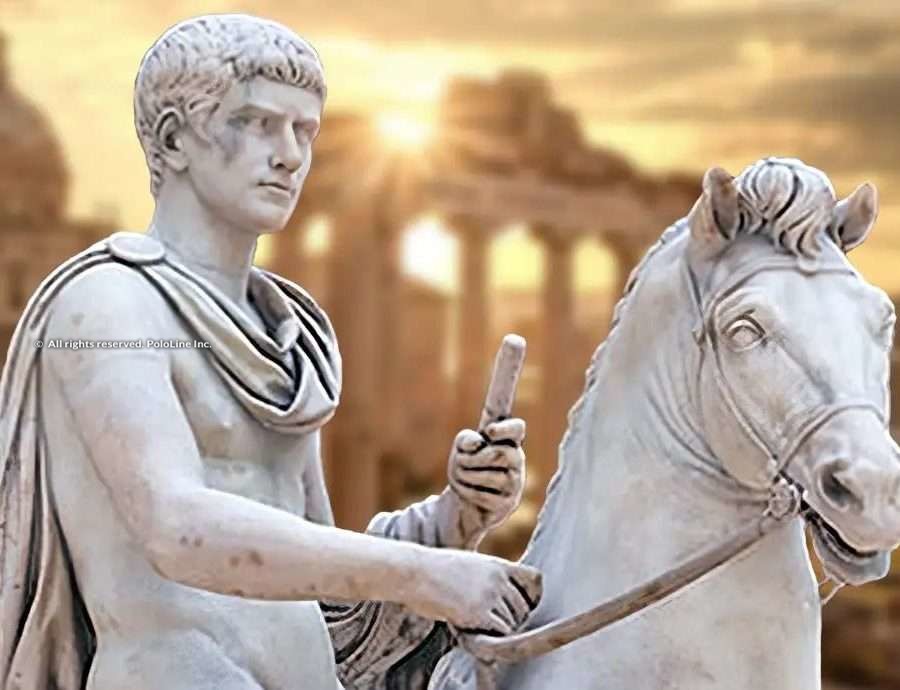By Alejandra Ocampo
One of the most renowned ancient civilizations was the powerful Roman Empire, a period that went through 27 BC to 476 AC, ruled by Emperors who were considered gods, although some of them were tyrants and extremely cruel. Among the most famous of those legendary Emperors is Nero, who is known for setting Rome on fire and his gruesome persecution of Christians. But we will focus on one in particular. Suetonious, the remarkable Roman biographer and historian, as well as many other historians, consider this Emperor as a monster and the worst of all them: his name was Caligula.
But it is not Caligula the subject of this article neither his short term as Emperor (37 BC-41 BC), but a very special character who became the center of his life, his favourite horse Incitatus. A legend says that the insane Emperor made the infamous proposal to make him a Consul of Rome. A horse Consul of Rome? Although there are some doubts on the matter, one thing is for sure – Caligula has been described as a man with a serious mental disorder that led him to extreme cruelty even towards his own family. So it wouldn’t be so strange at all that he decided to bestow one of most significant positions within the Roman Empire upon his favourite horse.
Incitatus (whose name means “Impetuous”), was a chariot race stallion, originally from Hispania (today, Spain). Horses In Ancient Rome were largely imported from Hispania (around 10.000 horses per year); the romans prefered them above all, due to their beautiful heads, big size, soft and smooth skin, as well as their speed, strenghth and courage on the battlefield.
No one know exactly when Caligula and Incitatus met; but Caligula made Incitatus his favourite horse and his behaivour towards the horse was the object of ridicule; his foolish treatment of the beautiful white stallion perhaps was a consequence of the Emperor’s mental disease, unknown to this date. Incitatus is said to have 18 servants for himself; in addition, Caligula made a marble stable for him and a palace with gardens and decorated with the finest furniture, where the insane Emperor brought his horse’s special guests.
Incitatus, who was decorated with rare and special precious stones and jewels and was dressed in purple (the colour of royalty and the most expensive in Ancient Rome), used to share the dinner with his owner; he was fed oats mixed with thin gold flake and drinked to his health in wine from golden goblets. It is said the horse’s meals also included mice, squids, mussels and chicken. The pervert Emperor found Incitatus a partner, a mare named Penelope.
Being a chariot race horse, Incitatus often took part of them. The night prior to a race, the Emperor ordered absolute silence under death penalty, in order to let the horse rest accurately. Of course Incitatus won all the races, but one day, he lost a race. Raged with fury, the Emperor ordered the execution of the auriga, the name given to the grooms in Ancient Rome. He commanded the executioner to kill the unfortunate auriga slowly and with extreme cruelty, to make him suffer as much as possible.
Suetonious suggests that Caligula made Incitatus a Consul, the highest rank within the Roman Empire, a position that was elected each year and provided much power and privilege. Many secure that Caligula proposed Incitatus for the position, as an insult and a mock to the Senate, accusing the institution of servility, treachery and hypocrisy; other sources reapeat this as a joke and a proof of Caligula’s insanity. However, the Senators didn’t complain at all; the initiative was perfect for them to plot against the insane Emperor.
It is unknown when Incitatus passed away; but one thing is for certain. Fed up of the tyrant and his insanity, the Senate plotted against Caligula, “the mad Emperor of Rome”; encouraged by the Senators, Caligula was stabbed 31 times to death by his own praetorian tribunes with the help of some centurions, on January 24 in the year 41 (BC). With the Emperor’s death, the power he bestowed upon his favourite horse, Incitatus, Consul of Rome, came to an end.
